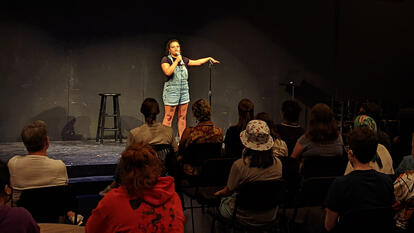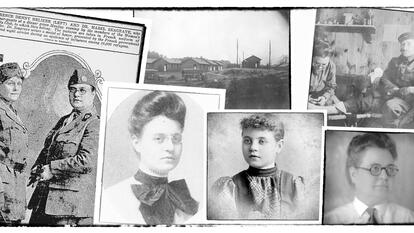
Intercultural Education Leaders Celebrate 20 Years at Wellesley
When Mared Alicea-Westort and Karen Shih joined Wellesley as the directors of multicultural programs and services in 2002, they were the first people to have these positions. Now, as they celebrate their 20th academic year at the College, Alicea-Westort and Shih are the assistant deans of intercultural education and co-advisors to Native American and Indigenous students. Alicea-Westort also advises the Latinx students and Fusion, Wellesley’s organization for mixed-race students, and Shih is the advisor to students of Asian descent.
Alicea-Westort and Shih start building relationships with Wellesley first-years in the spring and summer before they arrive on campus. “We send them an email to introduce ourselves and explain our roles,” Shih says. “We welcome them and tell them about the advising, programming, and support we provide. They can come to us for anything, and that gives them a sense of comfort.”
Throughout the academic year, Alicea-Westort and Shih send their advisees newsletters about community-building events to help them connect with the College’s many cultural organizations. “We do a lot of small events, like game nights and study breaks,” Alicea-Westort says. “We also host campuswide events such as Parrandas and Día de los Muertos to create an awareness of different aspects of our culture. Those big events, as well as the smaller ones, help students, faculty, and staff get to know each other better and build community.”
I’m so grateful to Karen. She played a huge role in making my Wellesley experience one that was a net positive for me.
Jenna Hua ’22
Before coming to Wellesley, Alicea-Westort, who majored in psychology at the University of Puerto Rico, had worked as a teaching assistant in graduate school, which inspired her to help other students. She found out about Wellesley because her sister-in-law was looking for a job in higher education and told her about the opening for a director of multicultural programs and services and advisor to Latina students. (Previously the College used “Latina” to describe students of Latin American descent; now Alicea-Westort uses the more gender inclusive/neutral terms “Latinx'' or “Latine,” which capture multiple intersectional identities.)
“She sent me the information, and I looked at it and said, ‘Wow, this is like it was written for me,’” Alicea-Westort says. “So, I applied, and I got the job. And here I am, 20 years later.”
Shih majored in business and accounting at National Taiwan University but later realized she wanted to study education and counseling. When she moved to the United States for graduate school, she intended to pursue counseling as a profession.
“For a while, my dream was to pursue counseling in private practice,” Shih says. “But when I got this job, I decided to stay here because I feel this position is more proactive. I can do outreach, advocacy, and programming, so I’m using a lot more skills.”
In their two decades at the College, Alicea-Westort and Shih have had an impact on generations of students. Yuby Hernández ’13, a first-generation college student from New York, remembers feeling “incredibly welcomed” during her first trip to Wellesley. When she met Alicea-Westort, she says, she noticed “how much the students respected and responded to [her].”
“Everyone spoke about how truly impactful she was to them and made them feel seen, and this really encouraged me to attend Wellesley,” Hernández says. “Once on campus, Mared made sure to have a one-on-one [meeting] with each of [the students she advised] and made sure we knew we could reach out to her!”
As a first-year, Jenna Hua ’22 struggled in her microbiology class and wanted to switch courses, but she didn’t know how. “I was just really freaked out and needed some advice,” she says. Shih reassured her that many students change classes during the first few weeks of the semester and helped her enroll in PSYCH 101: Introduction to Psychology taught by Stephen Chen, associate professor of psychology, which led her to major in psychology.
As a Latina activist at Wellesley, it could often feel very isolating, but I always felt that Mared had my back. Her support was immensely validating at a time when I was coming into my own power and finding my voice.
Briana Calleros ’12
“I’m so grateful to Karen,” Hua says. “She played a huge role in making my Wellesley experience one that was a net positive for me.”
Courtney Sato ’09 says she attended lunchtime meetings for the Pan-Asian Council (PAC), an alliance of Asian and Asian American student groups at Wellesley, among other lectures and speaker events that Shih organized. “Karen was always a foremost supporter of helping students execute whatever vision they had for events and programs, so her mentorship was critical to the very vibrant slate of events that the [Office of Intercultural Education and student organizations] offered every year,” she says.
Briana Calleros ’12 joined Mezcla, Wellesley’s largest Latinx cultural organization, as a sophomore and became its co-president as a senior. “I grew into leadership through Mezcla, and Mared was part of a small village of supporters who encouraged me,” she says. “As a Latina activist at Wellesley, it could often feel very isolating, but I always felt that Mared had my back. Her support was immensely validating at a time when I was coming into my own power and finding my voice.”
Alicea-Westort says building trust through community engagement is a key part of what she and Shih do on campus: “I think it’s very important for our group of students, who are historically marginalized and might not feel like they fit in or belong, to have a space where they can connect with people who have similar experiences.”
“We give them support. We advocate for them,” Shih says. “This is a small community, and people talk to other people … we build our reputation so that students know they can trust us.”
Alicea-Westort and Shih also work to expand all Wellesley students’ cultural competency. They hope the College continues to improve its ability to address the needs of a diverse, multicultural student body and realize its vision of inclusive excellence.
“The key is to build capacity,” Shih says. “A lot of students and faculty I work with have good intentions and want to learn, and they need to have the resources to translate the College’s institutional goals into action.”
Alicea-Westort agrees. “Intention is good, but we need action,” she says. “Building cultural competency is everyone’s responsibility, and I think we need to see more meaningful collaboration between programs and departments and be more intentional about our goals, objectives, and learning outcomes.”
Alicea-Westort and Shih both say that the most rewarding part of their jobs is helping students grow during their time at Wellesley.
“There are so many brilliant and passionate students, and I think those qualities rub off on you,” Alicea-Westort says. “You see them come in as first-years, and they may be a little shy, but by the time they graduate, you see them as student leaders.”
“I feel really blessed and honored that many of my students allow me to enter their world and really intimately get to know them,” Shih says. “I can use what I have to support them in a positive way, and I think that’s truly the best way to spend my energy.”



